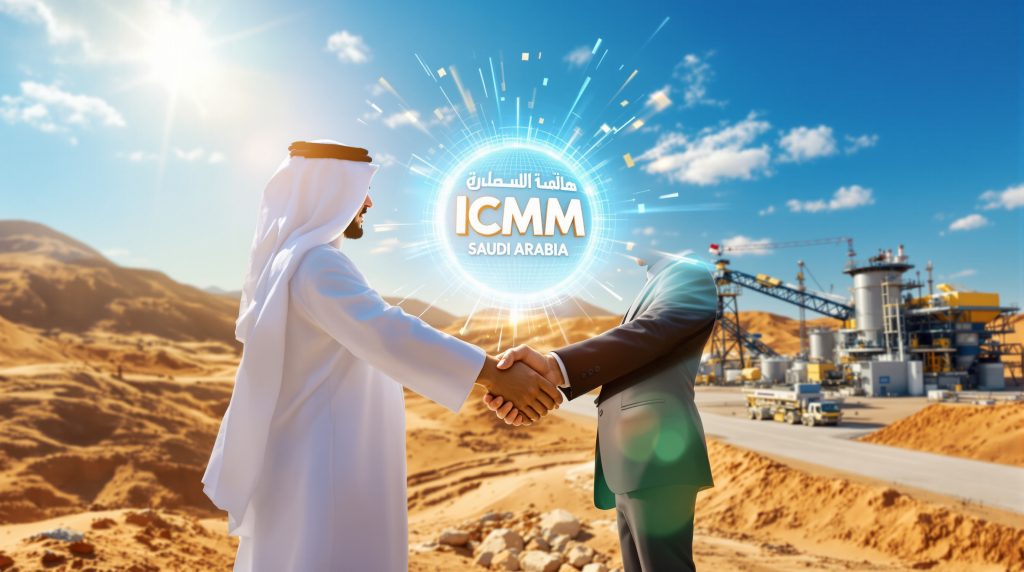ICMM Welcomes Maaden: A Strategic Milestone for Middle Eastern Mining
The International Council on Mining and Metals (ICMM) recently announced the admission of Maaden as its 26th company member, marking a significant evolution in the organization's global reach. As Saudi Arabia's leading mining company and the first from the Middle East to join this prestigious body, Maaden's ICMM membership represents a pivotal development in the mining industry's sustainability landscape. This milestone follows a rigorous vetting process, highlighting the growing international interest in ICMM's mission to elevate industry-wide sustainability standards.
How Does Maaden's ICMM Membership Impact Global Mining Standards?
Maaden's admission to the ICMM represents a strategic expansion of the organization's geographical influence and its continuing efforts to promote responsible mining practices worldwide. As the first Middle Eastern mining company to gain membership, Maaden's inclusion signals the growing recognition that sustainability principles must extend beyond traditional mining regions to achieve truly global impact.
The Strategic Significance of Maaden's ICMM Admission
Maaden's membership marks a historic first for the Middle East's mining sector, establishing a regional precedent for sustainability leadership. The company underwent ICMM's comprehensive independent assessment process, demonstrating its commitment to responsible mining practices. This admission comes shortly after another significant expansion of ICMM's footprint with the addition of Hindustan Zinc Ltd from India, highlighting the organization's strategic efforts to diversify its membership across emerging mining regions.
"With Saudi Arabia poised to play a pivotal role in the global minerals sector in the years ahead, we look forward to Maaden's active participation in ICMM's work and its contribution to advancing sustainable mining practices both in Saudi Arabia and across the region," noted Rohitesh Dhawan, President and CEO of ICMM, emphasizing the strategic importance of this development.
Maaden's Operational Profile and Growth Trajectory
Established in 1997, Maaden has developed a diverse portfolio spanning phosphates, aluminum, gold, and copper. The company currently operates 17 mining sites across Saudi Arabia and has positioned itself among the world's fastest-growing mining companies. With ambitious plans to expand tenfold by 2040, Maaden's growth strategy places it at the forefront of the mining industry evolution.
The company has already established partnerships with several existing ICMM members, creating a foundation for collaborative approaches to sustainability challenges. These relationships may prove valuable as Maaden implements ICMM's rigorous standards across its expanding operations.
Expanding ICMM's Global Influence
Maaden's admission reflects ICMM's strategic objective to extend its influence beyond traditional mining powers. By incorporating members from previously unrepresented regions, ICMM enhances its capacity to promote consistent sustainability standards worldwide. This geographical diversification strengthens the organization's legitimacy as a truly global voice for responsible mining practices, according to the International Council on Mining and Metals.
What Does ICMM Membership Require From Mining Companies?
Gaining ICMM membership involves a comprehensive evaluation process designed to ensure that new members demonstrate genuine commitment to the organization's sustainability framework. This thorough assessment protects the credibility of ICMM and maintains the value of membership as a recognized mark of sustainability leadership.
ICMM's Membership Assessment Framework
The cornerstone of ICMM's admission process is the review conducted by its Independent Expert Review Panel (IERP). This panel evaluates prospective members' alignment with ICMM's Sustainable Development Performance Expectations and Position Statements, applying rigorous standards to ensure that only companies with genuine sustainability commitments are admitted.
Successful candidates must secure formal endorsement from ICMM's Council, which comprises the CEOs of existing member companies. This peer-review mechanism adds another layer of scrutiny to the admission process, ensuring that new members meet the expectations of industry leaders already committed to ICMM's principles.
Member companies must also commit to regular third-party assurance and validation of their performance against ICMM's standards. This ongoing verification requirement distinguishes ICMM membership from voluntary sustainability initiatives that lack external verification mechanisms.
Maaden's Recognized Strengths in Sustainability
During its assessment, the IERP identified several areas where Maaden demonstrated strong alignment with ICMM's expectations. The panel specifically commended Maaden's robust ethical business conduct frameworks and comprehensive anti-corruption mechanisms, recognizing these as foundational elements of responsible corporate governance.
The company's sustainable development management systems received positive evaluation, along with its quality assurance and audit protocols. These operational frameworks provide the infrastructure needed to implement and monitor sustainability initiatives effectively across Maaden's diverse operations.
The IERP also noted Maaden's forward-looking strategy on diversity, equity, and inclusion (DEI) as a strength. This recognition highlights the increasing importance of social performance aspects within ICMM's conception of mining sustainability, extending beyond environmental considerations to encompass broader social responsibility.
How Will Maaden's Membership Influence Regional Mining Practices?
Maaden's position as the first Middle Eastern ICMM member creates an opportunity for the company to become a sustainability leader within the region's mining sector. This pioneering role could catalyze improvements in environmental, social, and governance (ESG) practices across an increasingly important region for global mineral supply chains.
Regional Impact of Maaden's ICMM Membership
Maaden's membership establishes a benchmark for sustainability performance in Middle Eastern mining operations. By implementing ICMM's comprehensive standards, Maaden creates a practical example of how international best practices can be adapted to the specific contexts and challenges of mining in the region.
This development creates a pathway for advancing ESG standards throughout the Middle East's mining sector. As Maaden demonstrates the business benefits of enhanced sustainability performance, other regional mining companies may follow suit, either through formal ICMM membership or by adopting similar practices independently.
Maaden's ICMM membership also aligns with Saudi Arabia's growing ambitions in the global minerals sector. As the country seeks to diversify its economy beyond hydrocarbons, developing a mining industry recognized for responsible practices supports national strategic objectives while responding to increasing international expectations for sustainable resource development.
Leadership Perspectives on the Partnership
Industry leaders from both ICMM and Maaden have emphasized the strategic significance of this membership. Rohitesh Dhawan highlighted Maaden's innovation, talent development, and leadership potential in responsible mining, connecting these attributes to Saudi Arabia's emerging role in global mineral markets.
Bob Wilt, CEO of Maaden, framed the membership as an opportunity for meaningful participation in shaping the future of mining: "This is about being part of conversations that matter. The way mining is done is changing, and we want to help lead that change – with ideas, action, and a clear sense of responsibility."
This leadership perspective suggests that Maaden sees ICMM membership not merely as a compliance exercise but as a platform for influencing industry direction. This proactive stance could amplify the impact of Maaden's membership beyond its own operations to affect broader industry practices.
What Commitments Does ICMM Membership Entail?
By joining ICMM, Maaden has committed to implementing the organization's Mining Principles, which define good practice environmental, social, and governance requirements for the mining and metals industry. These comprehensive standards require significant operational commitments and regular external verification.
ICMM's Mining Principles Framework
ICMM's Mining Principles comprise 40 specific performance expectations that address diverse aspects of mining sustainability. These detailed requirements provide clear guidance for implementing responsible practices across all phases of mining operations, from exploration and development through active production to closure and mine reclamation innovation.
These principles apply at the asset level, meaning they must be implemented at each operational site rather than merely as corporate policies. With ICMM's 26 company members now operating approximately 650 sites in 50 countries worldwide, the principles influence mining practices across a substantial portion of global production.
Third-party assurance is a fundamental element of the Mining Principles framework. This external verification requirement ensures that member companies cannot simply claim compliance but must demonstrate it through independent assessment. This verification mechanism enhances the credibility of members' sustainability claims and provides stakeholders with greater confidence in performance reporting.
Implementation Implications for Maaden
For Maaden, implementing ICMM's principles means establishing standardized ESG frameworks across all 17 of its current operations. This harmonization process likely requires reviewing and potentially upgrading existing management systems, particularly in areas identified for improvement during the admission assessment.
The company will need to participate in ICMM's regular performance assessment and reporting processes. These ongoing requirements create accountability for maintaining and improving sustainability performance over time rather than treating ICMM membership as a one-time achievement.
Maaden will also be expected to participate in ICMM's collective industry initiatives addressing systemic sustainability challenges. These collaborative efforts address issues beyond the capacity of individual companies to solve, such as tailings management, water stewardship, and mining decarbonisation trends.
Knowledge sharing represents another key aspect of ICMM membership. By engaging with other member companies, Maaden gains access to accumulated experience and innovative approaches while contributing its own perspectives and solutions developed in the Middle Eastern context.
How Does ICMM's Expanding Membership Reflect Industry Trends?
The addition of members from previously unrepresented regions demonstrates ICMM's growing global influence and reflects broader trends in how the mining industry approaches sustainability. This expansion pattern indicates shifting priorities and expectations across the sector.
ICMM's Strategic Membership Growth
Recent additions to ICMM's membership roster highlight the organization's strategic focus on geographical diversification. With new members from the Middle East (Maaden) and South Asia (Hindustan Zinc), ICMM is extending its reach beyond the traditional mining powerhouses of North America, Australia, and Western Europe.
This diversification beyond traditional mining regions reflects the changing geography of global mineral production. As mining activity increases in emerging economies, incorporating companies from these regions into global sustainability frameworks becomes increasingly important for maintaining consistent standards.
The growing representation across emerging markets also enhances ICMM's legitimacy as a truly global voice for the mining industry. By including perspectives from diverse operating contexts, ICMM can develop more universally applicable approaches to sustainability challenges while accounting for regional differences in priorities and constraints.
Industry-Wide Sustainability Momentum
ICMM's expanding membership coincides with increasing investor focus on ESG performance across the mining sector. As capital markets increasingly integrate sustainability considerations into investment decisions, mining companies face stronger incentives to demonstrate credible commitments to responsible practices.
Regulatory pressure for responsible mining practices continues to grow in many jurisdictions, creating additional motivation for companies to adopt recognized sustainability frameworks. ICMM membership can help companies navigate this evolving regulatory landscape by establishing systems that meet or exceed likely compliance requirements.
Rising stakeholder expectations for transparency also drive mining companies toward frameworks like ICMM that include robust disclosure and verification requirements. Communities, civil society organizations, and customers increasingly demand evidence of responsible practices rather than accepting unsubstantiated claims.
These trends are shifting competitive dynamics around sustainability leadership within the mining industry. As leading companies demonstrate that enhanced sustainability performance can create business value through improved stakeholder relationships, risk management, and operational efficiency, sustainability increasingly becomes a source of competitive advantage rather than merely a compliance cost.
What Role Will Maaden Play in ICMM's Future Initiatives?
As ICMM's newest member, Maaden is expected to actively contribute to the organization's ongoing work while implementing sustainability improvements within its own operations. The company's unique perspective as the first Middle Eastern member offers potential for enriching ICMM's collective understanding of mining sustainability challenges and solutions.
Anticipated Collaboration Areas
Regional sustainability leadership development represents a natural focus area for Maaden's ICMM participation. As the first member from the Middle East, Maaden is well-positioned to help ICMM understand regional sustainability priorities and develop approaches tailored to the specific contexts of Middle Eastern mining operations.
Knowledge sharing on responsible mining practices will likely flow in both directions. Maaden can gain insights from the accumulated experience of established ICMM members while contributing perspectives from its operations in Saudi Arabia's distinctive geological, environmental, and social settings.
Participation in ICMM's various working groups and committees offers Maaden opportunities to influence the organization's priorities and approaches. These collaborative forums address specific sustainability challenges, from climate change and biodiversity conservation to community development and indigenous peoples' rights.
Maaden may also contribute to developing and refining industry-wide sustainability standards. As ICMM continually updates its Mining Principles and position statements to reflect evolving best practices and emerging issues, input from members operating in diverse contexts helps ensure these standards remain globally relevant and practically implementable.
Strategic Alignment Opportunities
Integrating ICMM principles with Maaden's ambitious growth strategy presents both challenges and opportunities. As the company pursues its goal of tenfold expansion by 2040, incorporating sustainability considerations from the outset of new projects can reduce risks and costs compared to retrofitting existing operations.
Maaden can leverage the collective expertise of ICMM members to enhance its operational performance. Access to shared best practices and lessons learned can accelerate Maaden's sustainability journey, particularly in areas identified for improvement during the membership assessment process.
Building capacity for advanced sustainability practices throughout the organization will be essential for successful ICMM implementation. This capacity development may include training programs, management system enhancements, and recruitment of specialists in key sustainability disciplines.
Enhanced global credibility through ICMM association may support Maaden's international growth ambitions. As ESG considerations increasingly influence investment decisions, joint venture partnerships, and customer relationships, recognized sustainability credentials can create strategic advantages in competitive global markets.
FAQs About ICMM and Maaden's Membership
What is the International Council on Mining and Metals?
ICMM is a global organization dedicated to promoting sustainable development in the mining and metals industry. Founded in 2001, it brings together mining companies, industry associations, and equipment manufacturers committed to improving environmental, social, and governance practices across the sector. ICMM works through collaborative initiatives, knowledge sharing, and standard-setting to address systemic sustainability challenges in the mining industry.
How many companies are now members of ICMM?
With Maaden's admission, ICMM now comprises 26 company members operating across approximately 650 sites in 50 countries worldwide. These members represent a significant portion of global mining production across diverse commodities, including copper, gold, iron ore, nickel, zinc, coal, and aluminum. The membership also includes associations representing national and regional mining industries.
What makes Maaden's membership historically significant?
Maaden is the first Middle Eastern mining company to join ICMM, expanding the organization's geographical representation into a previously unrepresented region. This milestone is particularly significant given the Middle East's growing importance to global mineral supply chains and Saudi Arabia's ambitions to develop its mining sector as part of economic diversification efforts beyond traditional hydrocarbon resources.
How does ICMM membership benefit mining companies?
Membership provides access to shared best practices and collaborative problem-solving approaches developed by industry leaders. Companies gain opportunities to participate in shaping industry standards and positions on emerging sustainability issues. ICMM membership enhances credibility with stakeholders, including investors, regulators, communities, and civil society organizations. It also provides a framework for systematic improvement of sustainability performance across operations.
What is Maaden's current operational scope?
Maaden operates 17 mining sites across Saudi Arabia with a diverse portfolio that includes phosphates, aluminum, gold, and copper. Established in 1997, it has grown to become the largest mining company in the Middle East and one of the fastest-growing mining companies globally. The company has announced ambitious plans to expand tenfold by 2040, positioning it as a significant player in the future global minerals landscape.
The Evolving Landscape of Responsible Mining
Maaden's admission to ICMM represents more than an organizational milestone—it signals the continuing globalization of sustainability standards in mining. As the industry faces increasing scrutiny over its environmental and social impacts, ICMM's expanding membership demonstrates growing recognition that responsible practices are becoming essential to mining's social license to operate.
The addition of members from previously unrepresented regions like the Middle East indicates that sustainability is no longer perceived as a Western-driven concept but is increasingly embraced as a global business imperative. For Maaden, ICMM membership provides both validation of existing practices and a framework for continuous improvement as the company pursues its ambitious growth targets.
As mining continues to play a crucial role in providing the materials needed for energy transition and mining security, organizations like ICMM will likely become increasingly important in ensuring that resource extraction delivers benefits while minimizing negative impacts. Maaden's participation in this global community of practice positions the company to contribute to and benefit from this collective journey toward more responsible mining.
Mining companies worldwide increasingly recognize that addressing sustainability challenges effectively requires collaborative approaches that extend beyond individual corporate initiatives. By bringing together companies operating in diverse contexts, ICMM facilitates knowledge sharing and collective action on systemic issues from tailings management to climate change mitigation.
The consistent implementation of ICMM's Mining Principles across approximately 650 operations worldwide represents a significant step toward establishing globally recognized standards for responsible mining. As these standards gain further recognition from investors, regulators, and communities, they create stronger incentives for non-member companies to adopt similar practices.
For regions like the Middle East with developing mining sectors, the presence of ICMM members like Maaden creates opportunities to integrate modern ESG mine planning from the outset rather than addressing them reactively. This proactive approach can reduce long-term costs and risks while enhancing the sector's contribution to sustainable development objectives.
As global demand for minerals continues to grow, particularly those required for clean energy technologies and digital infrastructure, responsible mining practices become increasingly essential for securing the social license to operate. ICMM's expanding membership demonstrates the mining industry's recognition of this fundamental reality and its commitment to addressing the challenges it presents.
Ready to Stay Ahead of Major Mineral Discoveries?
Discover significant ASX mineral discoveries the moment they happen with Discovery Alert's proprietary Discovery IQ model, turning complex mineral data into actionable insights. Understand why major mineral discoveries can lead to significant market returns by exploring Discovery Alert's dedicated discoveries page, showcasing historic examples of exceptional outcomes.




